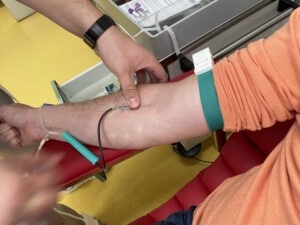
Imagine a big tank or a pool. Water is pouring into the tank at the top. At the bottom, an opening is letting the water out. As long as the water is going in at a faster rate than it’s escaping, the tank stays mostly full. If the water pressure decreases, or the opening at the bottom becomes larger, the tank slowly empties. Our “tank” is our emotional well-being. A full one means you are thriving; serotonin abounds and you are able to pour out to others with little risk to your own health. A little less full can mean stress and anxiety. Emptier still leads to emotional issues, high blood pressure, and panic attacks. Almost totally empty is a recipe for a total nervous breakdown.
Years ago, my dad showed me this lesson given by Wayne Cordeiro. It’s such a simple concept: In order to thrive, you need more filling you than draining you. Simple, yet difficult, especially for us parents. Alarms will sound as the tank reaches lower levels, but it’s easy to disregard those warnings for the sake of our families.
In January of this year, a decision was made and an ongoing crisis began in our family; even as I type this, the devastating effects are still rippling through our households (this impacted both sides of our blend). For the first three months, I felt frozen. I put myself aside, mostly, and tried to meet the needs of my husband and each of my five children as best I knew how: through prayer, listening, encouragement, heavy conversations, purposeful distractions, and trying to stay consistent. I kept thinking about how much everyone was going through, but somehow, I forgot to acknowledge that I was going through it too. Let’s add in relational discord, teenage emotions, appointments, paperwork, increased coparenting insecurities and eggshell conversations, overstepping, and threats of lawsuits….and three months in, I suddenly couldn’t take it. I started dropping every plate. I was insensitive at a time others needed me to be extra sensitive. I was impatient over the smallest thing, especially with my husband. I quit making dinner for everyone because sitting around a tense table with demanding toddlers was too much (and I don’t even like cooking). I stopped singing to myself. I avoided being in the house whenever I could. I’d been ignoring the alarms indicating a quickly draining emotional tank for too long.
And the main one responsible for allowing that to happen was me.
The last two months have been a harsh but important time of shifting rhythms in my life and home. I checked those rocks (see my previous article), and then set/reset some boundaries. My husband and I are seeing a therapist, praying together more, and not allowing every conversation to center around the children and the drama. We made some hard adjustments to how we handled the older three kids. I go out with friends regularly, mainly those who remind me of who I am at my core. I’ve backed away from supporting other friends, a particularly difficult release. I’ve started exercising most days, though I can’t say a shower always follows. I spend more time leaving the area to explore new places and right now, it’s worth the extra dollars. Even just a week of modifications eased the tense atmosphere in our household, decreased my stress levels, and increased my emotional elbow room.
I’m not looking for applause or pity; my problems are far from over. Just being real. The excruciating part now is waiting to see if the others involved in this crisis will also courageously take responsibility and make changes. I wait without knowing how long that will take, or if it will even happen. Some days I can enjoy life and focus on what’s right in front of me. Other days it hurts to breathe.
If your tank is slowly depleting, pay attention. Taking the time to keep your tank full means you have something to give and it makes you a better parent, spouse, and friend. So, think purposefully about what fills and drains you, and don’t wait until your life is in crisis mode. When do you feel most alive, and how can you do more of that when life is tough? What seeps your energy quickly, and how can you remove or step back from those things to slow the flow? You can check out my tank in the attached photo. As you reflect, here are some suggestions to really make this work for you:

- Write it down…if you’re like me, you may struggle with remembering how to help yourself while in the midst of an overwhelming season. Make a list and put it in a journal, a personal file, or somewhere on your phone or computer. Revisit it every so often to see what’s changed.
- Even better…do #1 together with your family members. Knowing what restores your spouse and children when they seem run down is an opportunity to love on them, and to help them take responsibility for their own well-being.
- Be specific….for example, list names rather than just writing “friends”.
- What drains your tank isn’t necessarily bad…young children are a source of joy, but generally take more than they give. The same could be said for some jobs, long-term care of a sick relative, or paying bills.
- The line between a want and a need can be blurry…heck, you may not even be sure what fills you. Ask someone who knows you well for their thoughts and to help you make balanced decisions.
I’ll write more later on how critical it is to have those supportive people in your life. You’re going to need their help to make these changes. Until then, keep those tanks full.
Wayne Cordeiro is the Founding Pastor of New Hope Christian Fellowship and current Lead Mentor at Lancaster Bible College. The full teaching is called “Dead Leader Running” and you can check it out here: Pastor Wayne Cordeiro – Dead Leader Running – YouTube





















